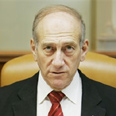
Olmert: We could have only dreamed of such a scenario
Prime minister says that if someone would have told him a month and a half ago about the current situation, he would said he was dreaming of unrealistic goals. Says cautiously, 'could be deterioration'
His poll results are abysmal, protestors are practically beating down the door to his office but, despite all that, Prime Minister Ehud Olmert spoke proudly in a Sunday morning cabinet meeting of the accomplishments of the Lebanon war. According to him, prior to the war, its outcomes would have been considered a "fantasy".
"If someone would have told me a month and a half ago that there would be a multinational force and Lebanese army presence in the south, that UN Security Council resolution 1559 would begin to be implemented, that the UN Secretary-General would says that the multinational force could disarm Hizbullah, that there would be an arms embargo in Lebanon, observation of crossings, and all this while the IDF sat in Lebanon without being dragged into combat, despite a continued aerial and naval blockade - I would have said he was dreaming and that he shouldn't try to set unrealistic objectives."
Olmert added: "These are, at least in part, the objectives that we set at the beginning of the war. There are additional factors that supplement these objectives." Nonetheless, the prime minister was careful not to be too optimistic, saying "I'm not exaggerating or declaring a drastic change of situation. The reality could deteriorate. However, we can definitely see an important turning point."
Multinational force comes into being
UN Secretary-General Kofi Annan said, at the conclusion of a meeting of EU foreign ministers in Brussels this weekend, that European nations would contribute 6,900 troops to the multinational force deploying in south Lebanon.
Annan stated that "Europe constitutes the spine of the force. We can now begin constructing an authentic force." The agreement to send troops marked the end of a tense period between the UN and European nations regarding the latter's reluctance to contribute to the force.
Annan proposed that France would lead the force in Lebanon until February 2007, and afterwards, Italy would lead it. The Finnish foreign minister estimated that a complete force would be deployed within two or three months. Italy agreed to send 3,000 troops to Lebanon, France 2,000 and Poland 500. Belgium and the Netherlands will also send hundreds of soldiers.
French Defense Minister Michele Alliot-Marie said Saturday that French soldiers would arrive in Lebanon within 20 days, as part of 3,500 troops to arrive in the region in the initial phase of deployment. The rest of the force in anticipated to arrive within the coming months.










